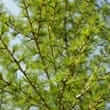Background
- Arabinogalactans belong to a group of carbohydrates called polysaccharides. When consumed in the diet, arabinogalactan comes from the wood of the larch tree (Larix species) and is approved for use as a dietary fiber by the U.S. Food and Drug Administration (FDA).
- As a dietary supplement, larch arabinogalactan is used to stimulate the immune system, to fight cancer, and as a prebiotic (a substance used to improve bacteria in the colon). Early study suggests that arabinogalactan may help grow beneficial bacteria in the digestive tract. However, human study has not found that the larch arabinogalactan stimulates the immune system.
- Future uses of arabinogalactan may include simultaneous use with certain drugs, because arabinogalactan may improve drug effectiveness when used together.
- Arabinogalactans are found in the cell walls of plants and bacteria and in pollen from mugwort and ragweed that causes allergies. Although these arabinogalactans are also discussed in this monograph, there is no evidence to suggest that dietary arabinogalactans from larch or other plant species have similar effects.
References
- Ambrus JL, Ambrus CM, Shields R, et al. Effect of galactose and sugar substitutes on blood insulin levels in normal and obese individuals. J Med 1976;7(6):429-438.
View Abstract - Deters AM, Lengsfeld C, Hensel A. Oligo- and polysaccharides exhibit a structure-dependent bioactivity on human keratinocytes in vitro. J Ethnopharmacol 12-1-2005;102(3):391-399.
View Abstract - Ehrenfreund-Kleinman T, Domb AJ, Jaffe CL, et al. The effect of amphotericin b derivatives on Leishmania and immune functions. J Parasitol 2005 Feb;91(1):158-63.
View Abstract - Kim LS, Waters RF, Burkholder PM. Immunological activity of larch arabinogalactan and Echinacea: a preliminary, randomized, double-blind, placebo-controlled trial. Altern Med Rev 2002;7(2):138-149.
View Abstract - Kremer LS, Besra GS. Current status and future development of antitubercular chemotherapy. Expert Opin Investig Drugs 2002;11(8):1033-1049.
View Abstract - Marett R, Slavin JL. No long-term benefits of supplementation with arabinogalactan on serum lipids and glucose. J Am Diet Assoc 2004;104(4):636-639.
View Abstract - Morris SL. Antigens of the Mycobacterium avium, Mycobacterium intracellulare complex. Eur J Epidemiol 1991;7(4):328-338.
View Abstract - Muchmore AV, Decker JM, Blaese RM. Spontaneous cytotoxicity by human peripheral blood monocytes: inhibition by monosaccharides and oligosaccharides. Immunobiology 1981;158(3):191-206.
View Abstract - Rampton DS, Cohen SL, Crammond VD, et al. Treatment of chronic renal failure with dietary fiber. Clin Nephrol 1984;21(3):159-163.
View Abstract - Robinson RR, Feirtag J, Slavin JL. Effects of dietary arabinogalactan on gastrointestinal and blood parameters in healthy human subjects. J Am Coll Nutr 2001;20(4):279-285.
View Abstract - Shanmugam M, Mody KH, Siddhanta,AK. Blood anticoagulant sulphated polysaccharides of the marine green algae Codium dwarkense (Boergs.) and C. tomentosum (Huds.) Stackh. Indian J Exp Biol 2001;39(4):365-370.
View Abstract - Roxas M, Jurenka J. Colds and influenza: a review of diagnosis and conventional, botanical, and nutritional considerations. Altern Med Rev 2007;12(1):25-48.
View Abstract - Sensi P. Approaches to the development of new antituberculosis drugs. Rev.Infect.Dis. 1989;11 Suppl 2:S467-S470.
View Abstract - Singha PK, Roy S, Dey S. Antimicrobial activity of Andrographis paniculata. Fitoterapia 2003;74(7-8):692-694.
View Abstract - Stein GM, Edlund U, Pfuller U, et al. Influence of polysaccharides from Viscum album L. on human lymphocytes, monocytes and granulocytes in vitro. Anticancer Res 1999;19(5B):3907-3914.
View Abstract







